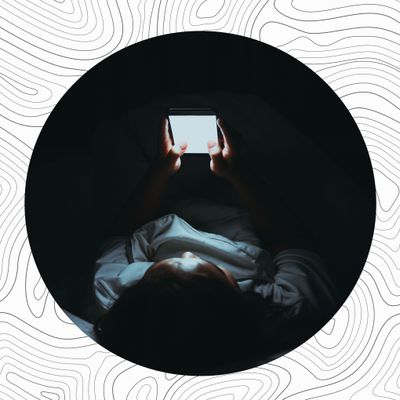
Before the pandemic began, I had the sort of bedtime routine Arianna Huffington would be proud of. I’m talking hot-shower-with-eucalyptus-branches-, leave-my-electronics-in-another-room–level stuff. Once the pandemic hit, however, my bedtime routine consisted of hours of doom-scrolling on Instagram, reading, and rewatching the original Twilight Zone. I’d follow the clock, knowing exactly what time it was, thinking I should probably sleep (and then not). After spending the day working, I needed time to myself to do “nothing.”
It turns out, there’s a name for this phenomenon: “revenge bedtime procrastination,” translated from a Chinese internet term. Essentially, when we don’t have enough control over our lives during the day, our brains help us regain control by carving out “me time” later — at the cost of sleep. And if the pandemic has done one thing, it has stolen our power.
The extent of this phenomenon in the context of the past 15 months is still new and has yet to be researched. What we do know is that women are especially likely to indulge in it, and the more stressful our lives are during the day, the more likely we are to be revenge bedtime procrastinators.
So how does one stop procrastinating on sleep?
Reduce your workload
Stress and sleep disorders are closely linked. Manage the stress, and it stands to reason you’re well on your way to a good night’s rest.
Positive psychologist and motivational speaker Kezia Luckett suggests reducing your working hours so your last meeting is no later than 7 p.m. As a freelancer and type-A person who needs to check everything off my to-do list, I’ve found scheduling a time to stop working the most useful addition to my new routine.
Unfortunately, the pandemic has seen us put in more working hours than usual. According to NordVPN Teams, a New York–based company that provides virtual private networks, there has been a global shift toward working more. The U.S. has seen a 2.5-hour increase in the average workday on account of Zoom calls, no commutes, and the expectation that employees stay reachable throughout the day. A survey of 1,000 Americans published by TELUS International last year found that “four out of five workers find it hard to ‘shut off’ in the evenings.”
Set yourself up for success during the day using ‘micro-moments’
Luckett suggests this all starts with good habits during the day: “Establish a routine throughout the day with ‘micro-moments’ of you time,” she says. Micro-moments are five-to-ten-minute breaks evenly spaced throughout the day that reconnect you with yourself. Luckett suggests using the Pomodoro technique and setting an alarm every 45 minutes to move, both mentally and physically. Doing so pulls us out of our heads and back into our bodies.
Reflect on your day
Gratitude journaling is trendy right now, and a quick search for gratitude journals on Amazon reveals a plethora of options. But whether you choose to actually write down your gratitude list or not, research suggests that gratitude practice balances out uncertainty.
“Allowing yourself to fall asleep involves surrender,” says Dr. Jeanette Raymond, a Los Angeles–based clinical psychologist. “[That] is scary if you believe that you need to be [constantly] vigilant.” Instead, says Raymond, it may be useful to reflect on your day and take note of what went right. “Those reflections calm the fear centers of the brain,” says Raymond, adding, “the polyvagal nerve can bring those feelings of safety and security back, allowing for a smoother transition to sleep.”
Inhale, exhale
One notable thing happens when we sleep: Our breathing is slow, calm, and regular. Our brains have evolved to know we’re safe when we’re breathing like this.
Sleeping involves giving up control, which in and of itself is terrifying for those with high stress, explains Raymond: “Breathing exercises are known to stimulate the polyvagal-nerve response to produce the safety and trust responses.” A number of studies confirm that breathing exercises are effective against both anxiety and insomnia. The next time you find yourself wanting to reach for your phone and get into an argument in the comments section of a YouTube video (ahem), try some breath work instead. The Calm app is my new go-to when I need to just breathe.
Make your bedroom a haven
“Stop using electronics at least an hour before bed and remove them from the bedroom,” says Luckett. I am instantly reminded of Arianna’s advice (we’re on a first-name basis in my head). It’s obvious that if your electronics are what’s enabling your procrastination, removing them solves the bulk of the issue, but it’s more than that: Blue light from electronic devices messes with our body clocks.
In addition to making your bedroom an electronics-free zone, Luckett suggests creating “a nourishing and supportive bedroom space.”
“Declutter and remove any distractions from the bedroom, including the TV,” she says.
Separating work and play (and sleep) is essential for our brains to draw and respect boundaries. The moment our brains don’t know the difference between our work space and leisure space, the mental association we have between our beds and the act of sleeping is gone.
(Re)instate a nighttime routine
Raymond stresses that safety and vulnerability are necessary to surrender to sleep: “Those features can be brought in via emotional intimacy with a partner, a pet, a child, and identifying with a[n] [onscreen] or print character.”
As long as you’re not engaging with said onscreen character through a bedroom TV, screen time as a means of ending the day should be fine (as long as you’re still keeping the last hour before bed screen free). A 2012 study even went so far as to find that watching familiar shows restores our sense of self-control.
Look closely at your stressors
At the end of the day, if Stephen Fry reading you a story about lavender in the south of France doesn’t work, it’s time to dig deeper and address the cause of your daytime stress. “We have created a legacy around hard work, rather than enjoyable work,” says Luckett. “When we empower individuals to self-regulate their work, their stress levels, and their schedules, revenge bedroom procrastination will become a thing of the past.”
Perhaps all it’ll take is a chat with your boss about managing your own time. After all, studies have proven that flexibility increases productivity.




